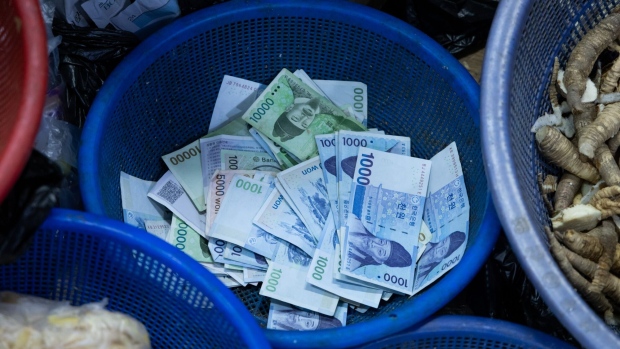Apr 10, 2024
Korean Stocks, Won Fall as Ruling Party Suffers Election Loss
, Bloomberg News

(Bloomberg) -- South Korean stocks wiped out early losses Thursday as investors said the impact of a setback for President Yoon Suk Yeol’s party in parliamentary elections will be short-lived.
The benchmark Kospi closed up less than 0.1%, erasing its earlier decline of as much as 1.6%, as chipmakers climbed. The won held losses against the dollar after dropping to a 17-month low, as stronger-than-expected US inflation data stoked broader risk aversion, strengthening the greenback and overshadowing the impact from the local elections.
Continued optimism over the demand outlook for memory chips due to the boom in artificial intelligence helped offset initial market jitters over the vote. Market participants remain wary that a stronger majority for the opposition party will make it more difficult for Yoon to push through initiatives, including the “Corporate Value-up Program” aimed at boosting shareholder returns.
“There may be a short-term correction due to concerns about the weakening momentum behind the Value-up,” Choi Kwangwook, chief investment officer at TheJ Asset Management Co., said earlier. “But the ruling party may have to further strengthen their investor-friendly capital market policies to better appeal to the public.”
Read More: Big Loss Turns Pro-Business Yoon Into Lame Duck in South Korea
Excitement over the government-led plan to improve company valuations has helped drive the Kospi up 11% from a January low, riding record quarterly foreign inflows to Korean stocks. Overseas funds have poured more than $13.5 billion into the market this year on a net basis, with Samsung Electronics Co. and SK Hynix Inc. the biggest recipients.
Meanwhile, the South Korean currency has lost 5.6% this year, the most in emerging Asia after the Thai baht, as robust US data clouded expectations for a near-term rate cut by the Federal Reserve.
“Election-related uncertainties will fade soon,” said Wee Khoon Chong, senior Asia Pacific market strategist at BNY Mellon in Hong Kong. “Considering there isn’t a lot of election outcome optimism priced into the market, we see limited election-related volatility,”
Yoon’s People Power Party-bloc secured 108 seats in the 300-seat unicameral parliament, down from 119 before the vote, according to the final count by the National Election Commission. The opposition Democratic Party-bloc expanded its majority with 175 seats. The DP group held 169 seats before the vote.
Following the election, the stock market momentum from the corporate reform campaign is likely to “temporarily weaken for the next several months and only become viable again” from around the middle of the second half of this year,” Citigroup Inc. strategists led by Jinwook Kim wrote in a note.
South Korea’s tech-dominated equities have traded at lower valuations to global peers, hurt in part by the complicated legacy relationships of its chaebol, or conglomerate, system. The Value-up program was seen as an attempt to address this so-called “Korea discount,” similar to recent reform efforts in Japan.
Value-up may see continuity despite the ruling party’s loss because the initiatives to fix Korea’s low stock valuations can receive bipartisan support due to growth in the retail investor base, said Han Jiyoung, an analyst at Kiwoom Securities Co.
--With assistance from Karl Lester M. Yap.
©2024 Bloomberg L.P.





